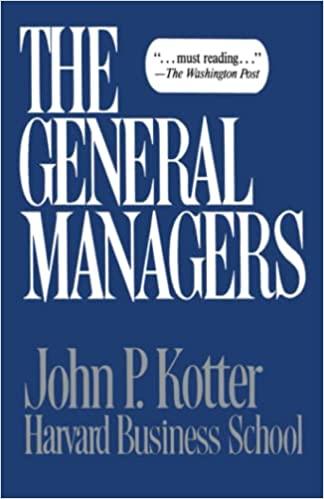Question
The Union and Employer are parties to a written collective-bargaining agreement (the CBA) covering a 30-member unit of production employees at a plant in Yuma,
The Union and Employer are parties to a written collective-bargaining agreement (the CBA) covering a 30-member unit of production employees at a plant in Yuma, Arizona.
The CBA has a no-strike, no-lockout provision and requires that all disputes and grievances be resolved under the grievance procedure in the agreement. The CBA includes a two-step formal grievance procedure prior to either arbitration or judicial enforcement. The CBA requires that formal grievances at step one and step two to be in writing, describe the facts, state the remedy sought, and identify the sections of the CBA claimed to have been violated.
The Union filed four grievances, none of which were resolved at Step two. The issues grieved were (1) a performance memo issued to an employee for having a negative and uncooperative attitude and suspending her for three days, (2) an employee being improperly hired and paid from the piece rate pool generated by senior unit employees, (3) an operator improperly given a share of group piecework pay for work done by other unit employees, (4) a written warning issued to the entire crew for asserted violations of company policy and a work rule.
The Union sent separate letters to the State Mediation and Conciliation Service requesting a panel of arbitrators for each grievance. Each of the letters stated, inter alia, "This matter is a labor dispute involving interpretation and application of a collective-bargaining agreement."
The Employer refused to arbitrate these grievances, contending that they were not subject to arbitration under the CBA.
Issue Was the Employer's refusal to arbitrate the grievances an unfair labor practice?
Union Position An employer's refusal to arbitrate grievances, pursuant to a collective-bargaining agreement, violates Section 7 of the act if the employer's conduct amounts to a unilateral modification or wholesale repudiation of the collective-bargaining agreement. The Union charged that the Employer's refusal to arbitrate grievances in this case was both an unlawful contract modification and an unlawful unilateral change. In refusing to arbitrate the grievances, the Employer relied on the narrow language of the arbitration clause, which excludes from arbitration disputes concerning contract interpretation or matters which involve management decision or business judgment. The Union asserts that the grievances at issue here were not excluded by the language of the contact, and that even assuming that there was some arguable basis for the Employer's position, the Employer was required to arbitrate the arbitrability of the grievances. The Union further argues that the Employer's conduct is a "wholesale" repudiation of the arbitration procedure.
Employer Position It is well settled that arbitration is a matter of contract, and a party cannot be required to submit to arbitration any dispute that the party has not agreed to submit. The CBA in this case contains a very narrow arbitration clause, expressly excluding, inter alia, "[d]isputes concerning contract interpretation ... management decision or business judgment." The Employer contended that the four grievances concerned contract interpretation, management decisions, or business judgment and were therefore excluded from the arbitration provision. The Union itself initially took the position that the four grievances involved contract interpretation; the Union's letters requesting the arbitration of those grievances stated that the "matter is a labor dispute involving interpretation and application of a collective-bargaining agreement." Given the nature of the grievances and the Union's own characterization of the four grievances as involving contract interpretation, the Employer was under no obligation to arbitrate the four grievances.
Questions As arbitrator, what would be your award and opinion in this arbitration?
Identify the key, relevant section(s), phrases, or words of the collective bargaining agreement (CBA), and explain why they were critical in making your decision.
What actions might the employer and/or the union have taken to avoid this conflict?
Step by Step Solution
There are 3 Steps involved in it
Step: 1

Get Instant Access to Expert-Tailored Solutions
See step-by-step solutions with expert insights and AI powered tools for academic success
Step: 2

Step: 3

Ace Your Homework with AI
Get the answers you need in no time with our AI-driven, step-by-step assistance
Get Started


